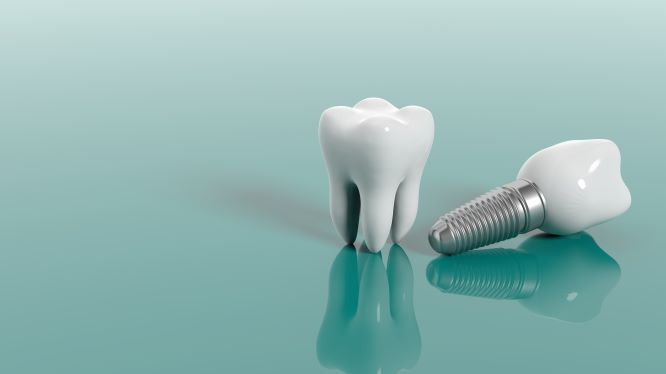
Tooth restoration is one of the most common challenges faced by the typical dentist. Common ways to address the problem include adhesive dentures, crowns, bridgework, and implants. Of these options, dental implants are currently considered the best choice for most patients. This is because implants replicate the same system used by your body to keep healthy natural teeth strong and secure.
What Makes Healthy Natural Teeth So Strong
Look at a diagram of the human jaw and you’ll see that each tooth joins to the bones beneath the gumline, ending in a horseshoe-shaped pattern called the roots. A series of nerve canals, tissue linings, and blood vessels enter the tooth at this point, keeping it stable and secure.
This is the reason why healthy natural teeth typically last a lifetime. But many factors can weaken this structure over the years. These include hereditary characteristics, medication side effects, and lifestyle choices.
Creating the best possible dental restoration requires recreating this natural system as closely as possible. Unfortunately, traditional approaches like adhesive dentures rely on surface adhesives to hold the appliance in place. This can cause serious issues for the patient, including:
- Jawbone degradation: The bones in your jaw rely on the stimulation provided by your teeth to stay vital. When they fail to get it they can eventually begin to degrade, causing aesthetic and practical problems for the patient.
- Unhealthy lifestyle changes: Those who wear adhesive dentures must often give up their favorite foods or prepare them in an entirely different way. They may also find themselves excluded from social occasions due to fears about the denture failing.
- Relining or replacement: Long-time denture wearers are familiar with this drawback. The product requires relining or outright replacement every few years due to alterations in the oral profile. These changes are caused largely by the limitations of the denture itself.
How Dental Implants Get Back to Nature
Dental implants avoid these disadvantages by drawing their strength from the jawbone, similar to how healthy natural teeth work. This approach offers significant benefits for the patient such as these:
- Peace of mind: With implants, there’s no need to worry about adhesive failure or the restoration itself shifting during meals or conversations.
- A better quality of life: Implants enable you to live life on your own terms.
- Ease of care: Permanently placed dental implants require no more care than you give your natural teeth. This includes brushing, flossing, and seeing your dentist as recommended for routine checkups.
- Lasting results: Implants can last from 20 years up to a lifetime with reasonable care. They’re crafted from lightweight yet resilient materials like aircraft-grade titanium for the fixtures and tooth-colored ceramics for the restored teeth themselves.
Dental implants are not the best solution for everyone. Only your dentist can recommend the right course of treatment for your situation. Talk to him or her soon about implants and other options. You’ll soon find yourself with a restored smile and a happier, healthier life.
About the Author
Dr. Brian Lee has been practicing dentistry for more than 15 years. He earned his DDS degree from the University of Michigan School of Dentistry, one of the most highly regarded dental colleges in the country. A skilled general dentist, Dr. Lee is also trained in implant placement and other restorative techniques. You can reach his office online or by calling (770) 205-1212.
